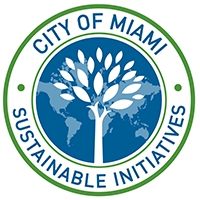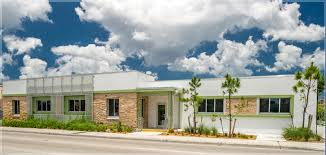
Office of Miami Sustainable Initiatives

Grant Resources:
Established in 2007, the City of Miami Office of Sustainable Initiatives (MSI) led the creation of MiPlan, the City’s Climate Action Plan which set targets for greenhouse gas reductions. Since then MSI has led efforts to implement the plan and become a model for environmental best practices. Highlights of the City’s recent sustainability accomplishments include the following:
• Energy Efficiency - In City owned buildings, an energy efficiency retrofit program has resulted in cost savings in excess of $320,000 per year to date from energy and maintenance reductions. In addition in 2013 in partnership with 6 other municipalities, the City launched the Green Corridor Property Assessed Clean Energy (PACE) program which makes energy efficiency improvements and renewable energy installations more accessible for all property owners in the City. To date, the program has financed 80 projects totaling $4 million.
• Trees - The City has planted or distributed over 6,000 trees in the last five years through its tree giveaway programs, street tree plantings, Arbor Day event, and other plantings. • Transportation - the City has increased alternative transportation options through addition of a trolley system serving 5 routes and 36 miles; increasing bicycle friendliness for the City; and increasing the fuel efficiency of its own fleet. Over the last five years, the City has added over 30 miles of bike lanes or bike marked roads.
• Waste - Through adoption of a single stream recycling program in 2012 the City has increased its annual recycling tonnage by a factor of
• Water - City code adopted in 2009 requires use of efficient water fixtures in new construction and restricts landscape irrigation to fixed times and days of the week.
• Green Building - Since 2010 the City has required LEED Silver certification for all new construction over 50,000 square feet. To date, 47 LEED certified projects have been completed within the City.
• Zoning Code - In 2010, the City adopted a Smart Growth based zoning code which emphasizes mixed use development around nodes of transportation.
1. Green Buildings
Building green offers many benefits for property owners, tenants, the community and the environment, including energy savings, water savings, healthy workplaces and homes. The City of Miami currently offers the following requirements and incentives for green building:• LEED Silver certification or equivalent is required for new construction over 50,000 square feet (as per Section 3.13 of the City of Miami zoning code, Miami 21 – www.miami21.org )
• Density bonuses are offered for exceeding green building certification levels (as per Section 3.14 of Miami 21)
www.miami21.org
• Expedited permitting is offered for green buildings as per Section 10-4(b)(3)(m) of the City of Miami Code of Ordinances,
https://library.municode.com/HTML/10933/level3/PTIITHCO_CH10BU_ARTIINGE.html#PTIITHCO_CH10BU_ARTIINGE_S10-4BUPEFESC
Information on other local and state incentives here:
http://www.dsireusa.org/incentives/index.cfm?state=FL&re=0&ee=0&spv=0&st=0&srp=1
Federal incentives are summarized here: http://www.dsireusa.org/incentives/index.cfm?State=US&ee=0&re=0
In addition, Florida Power and Light, our local utility has rebates and incentives for energy efficiency for homeowners http://www.fpl.com//residential/energy_saving/programs/index.shtml?cid=aliasprograms
and for businesses http://www.fpl.com/business/energy_saving/programs/index.shtml.
2. Recycling
Recycling reduces the burden on our landfills, saves energy, conservers our resources, and reduces the cost of waste disposal. For single family and duplex residences in the City of Miami, the City will pick up recycling once per week. Recyclable materials include paper, cardboard, glass, plastics, and metals. All recyclables can now be placed into a single bin without sorting. For more information, please see http://www.miamigov.com/SolidWaste/pages/recycle/recycling.asp Commercial and multifamily residences in the City of Miami are required by City Code to implement recycling programs as per sections 22-19, 22-20, and 22-21 of the Code of the City of Miami. https://library.municode.com/HTML/10933/level3/PTIITHCO_CH22GAOTSOWA_ARTIINGE.html#PTIITHCO_CH22GAOTSOWA_ARTIINGE_S22-19REPRREMUMIREFOUNMOIn addition, City residents may recycle larger electronics and other materials can be recycled at the City of Miami Mini Dump http://www.miamigov.com/SolidWaste/pages/Minidump/default.asp.
3. Miami Green Lab

The Miami Green Lab, located at 151 NW 27th, Ave houses the Office of Sustainable Initiatives and serves as a green building resource center for the community, and providing education on green building, energy conservation, and urban agriculture. This LEED Gold facility features energy-efficient and renewable energy technologies and systems, recycled construction materials. Miami Green Lab is open to the public 8 AM to 5 PM weekdays except holidays. To schedule a tour, an appointment, or to learn more about Miami Green Lab, please call 305-960-5191.
The Green Lab is a former fire station which was renovated to achieve LEED Gold certification and feature energy-efficient lighting, HVAC and appliances; solar energy technology; rainwater harvesting; permeable pavement; water-efficient fixtures and landscaping; and recycled construction and finish materials amongst other sustainable building features.This project was funded by the U.S. Department of Energy (DOE) administered, Energy Efficiency and Conservation Block Grant (EECBG) award for the City of Miami, as well as by a grant from the Home Depot Foundation.
4. Transportation
Petroleum run cars are the primary source of the greenhouse gases causing global climate change. Reducing your car and/or fuel usage can mean big savings for the environment and your wallet. When you need to get around the City consider the following options:• Bicycling http://www.miamigov.com/bicycleInitiatives/pages/
• Public transportation including:
o Miami Trolley http://www.miamigov.com/trolley/
o Metromover, Metrorail, and buses. http://www.co.miami-dade.fl.us/transit/
o Tri-Rail system. http://www.tri-rail.com/
• Carpooling http://www.1800234ride.com/
• Driving an electric, hybrid or other fuel efficient vehicle http://www.fueleconomy.gov/
5. Trees
Building a healthy tree canopy is critical to our City’s continued prosperity. Trees are an investment in our future. The City of Miami has adopted a tree master plan to increase the size and health of its tree canopy, which set a goal of attaining 30% tree canopy Trees:
• Provide shade and cool our city – saving up to 50% off a home’s electricity bill.
• Clean our water and provide habitat for birds and wildlife.
• Absorb carbon dioxide, which reduces global warming.
• Add beauty and thereby increase property values in our neighborhoods.
The City of Miami Code regulates tree removal, tree pruning and landscaping for new construction. http://ourgreenmiami.wordpress.com/tree-ordinances/
Residents can receive free trees from the City’s tree giveaways (announced at ourgreenmiami.org), and Miami-Dade County Adopt-a-tree events http://www.miamidade.gov/environment/adopt-a-tree.asp. In addition, property owners can request that trees are planted in the right of way in front of the property by contacting their local NET office at (305)960-4638.









